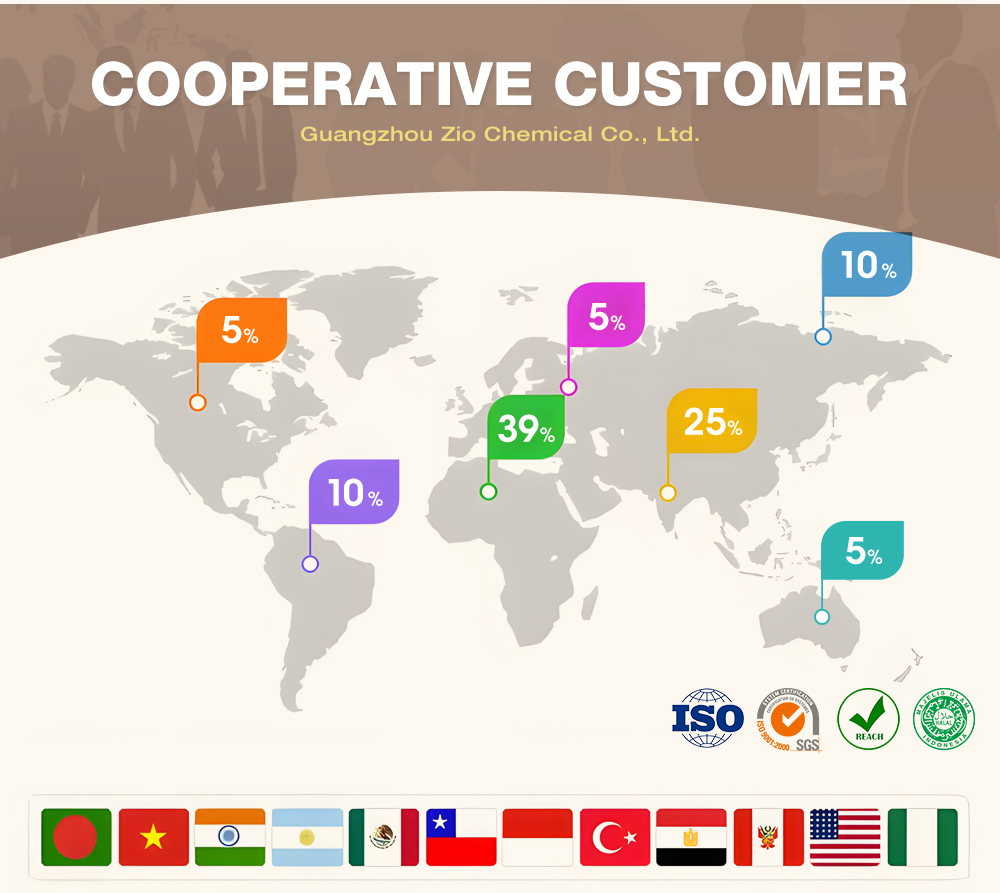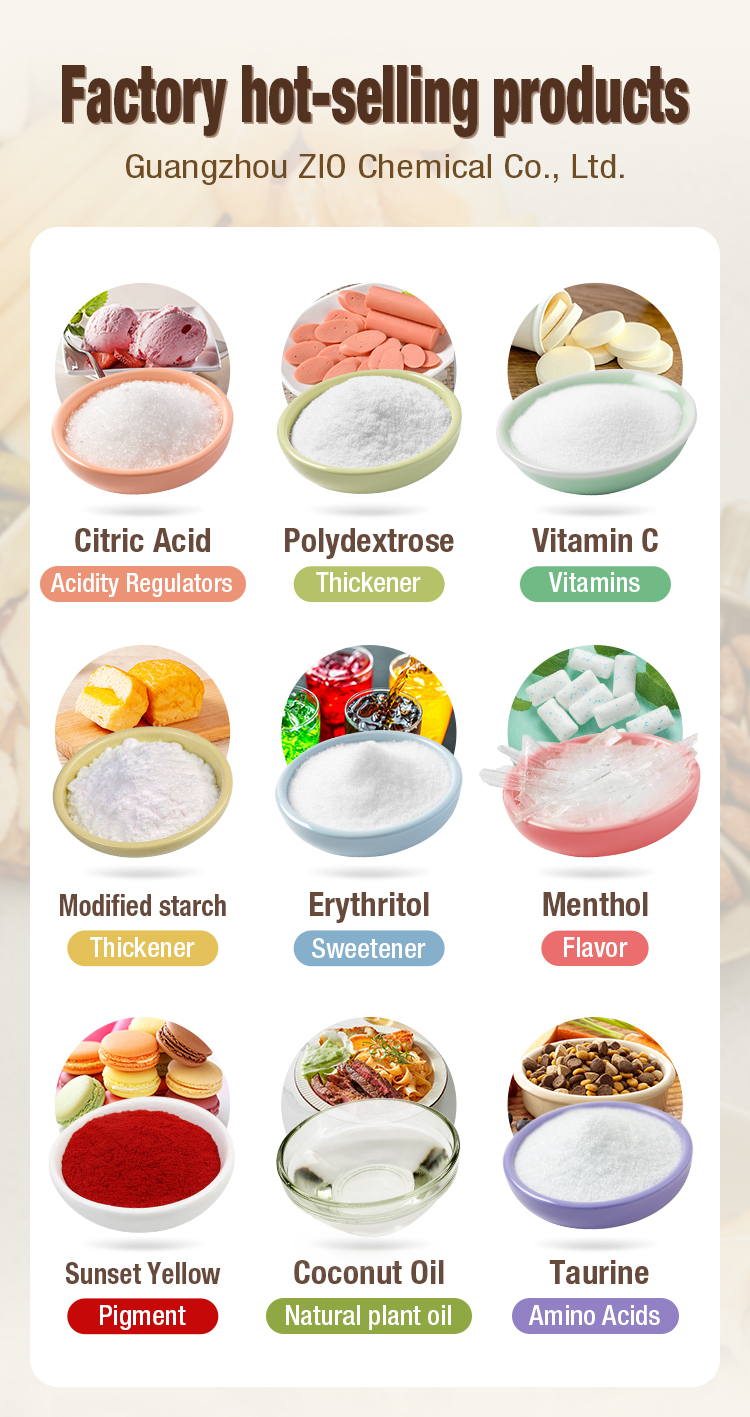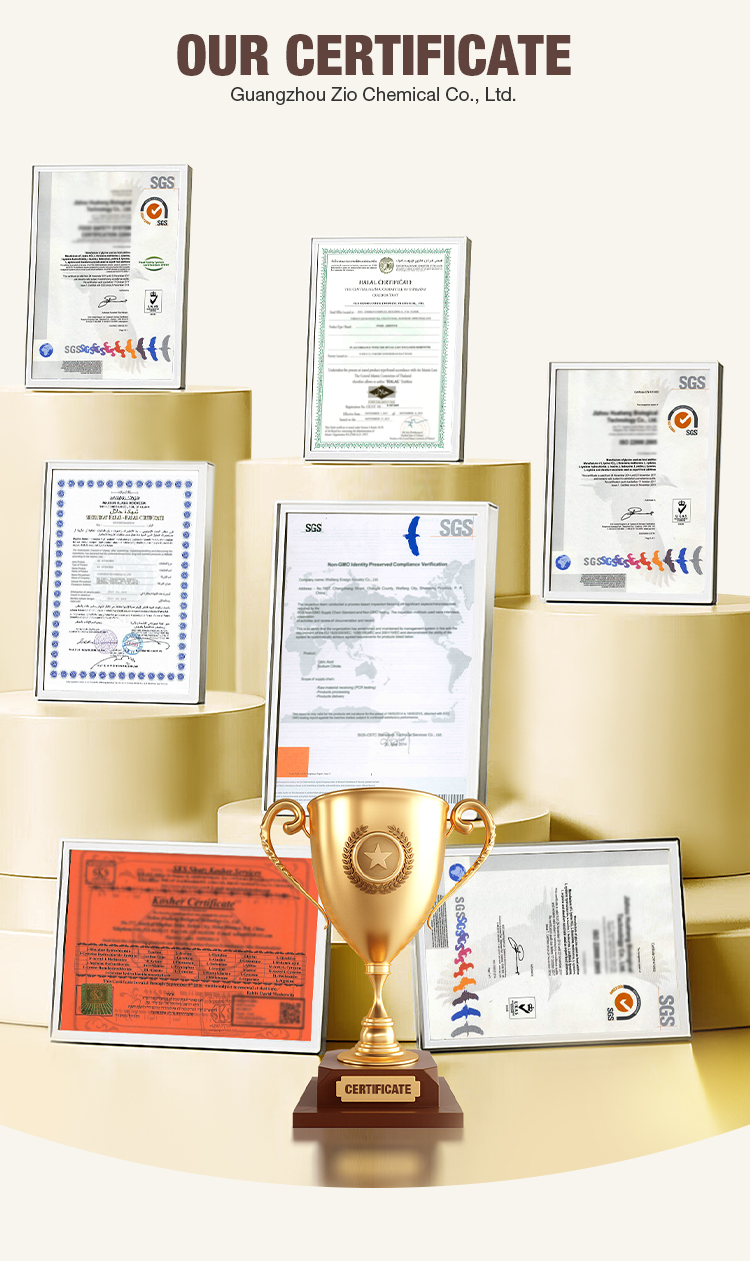Product Application
Vitamin C, also known as ascorbic acid, is a vital nutrient that plays a crucial role in maintaining overall health. This water-soluble vitamin is renowned for its powerful antioxidant properties, helping to protect cells from damage caused by free radicals. Vitamin C is essential for the growth and repair of tissues in the body, making it an important component for skin health, immune function, and overall vitality. It is commonly found in fruits and vegetables, particularly citrus fruits, but supplementation can help individuals meet their daily requirements, especially in cases of dietary deficiency or increased need due to stress, illness, or physical activity.

Method of application
Vitamin C can be consumed in various forms, including tablets, capsules, powders, and skincare products. Here are some guidelines for effective use:
Dietary Supplementation: For adults, a common recommended daily dose is between 500 mg to 1000 mg. It can be taken with meals to enhance absorption and minimize gastrointestinal discomfort.
Skincare Application: When used topically, vitamin C serums are applied directly to the skin after cleansing and before moisturizing. A few drops are sufficient for the entire face. Look for formulations with a concentration of 10% to 20% for optimal effectiveness.
Combining with Other Nutrients: Vitamin C works synergistically with vitamin E and other antioxidants. Consider supplements that combine these nutrients for enhanced health benefits.
Hydration: Ensure adequate hydration when taking vitamin C supplements, as it can increase the excretion of certain minerals.

Product Application
Vitamin C, also known as ascorbic acid, is a vital nutrient that plays a crucial role in maintaining overall health. This water-soluble vitamin is renowned for its powerful antioxidant properties, helping to protect cells from damage caused by free radicals. Vitamin C is essential for the growth and repair of tissues in the body, making it an important component for skin health, immune function, and overall vitality. It is commonly found in fruits and vegetables, particularly citrus fruits, but supplementation can help individuals meet their daily requirements, especially in cases of dietary deficiency or increased need due to stress, illness, or physical activity.

Method of application
Vitamin C can be consumed in various forms, including tablets, capsules, powders, and skincare products. Here are some guidelines for effective use:
Dietary Supplementation: For adults, a common recommended daily dose is between 500 mg to 1000 mg. It can be taken with meals to enhance absorption and minimize gastrointestinal discomfort.
Skincare Application: When used topically, vitamin C serums are applied directly to the skin after cleansing and before moisturizing. A few drops are sufficient for the entire face. Look for formulations with a concentration of 10% to 20% for optimal effectiveness.
Combining with Other Nutrients: Vitamin C works synergistically with vitamin E and other antioxidants. Consider supplements that combine these nutrients for enhanced health benefits.
Hydration: Ensure adequate hydration when taking vitamin C supplements, as it can increase the excretion of certain minerals.

Product Informations
| Name | Vitamin C |
| Ingredient | vitamin c effervescent tablets |
| Specification | 25kg |
| Capacity | 25.000 kg |
| Place Of Production | Guangdong, China |
| Shelf Life | Check the expiration date on the packaging. Most vitamin C supplements have a shelf life of 2 to 3 years when stored correctly. |
| Storage Conditions | Store vitamin C supplements in a cool, dry place, away from direct sunlight and humidity. A dark container can help protect it from light exposure, which can degrade the vitamin. |
| Handling Precautions | If using powdered vitamin C, handle it with dry hands and avoid moisture to prevent clumping and loss of effectiveness. |
Product Informations
| Name | Vitamin C |
| Ingredient | vitamin c effervescent tablets |
| Specification | 25kg |
| Capacity | 25.000 kg |
| Place Of Production | Guangdong, China |
| Shelf Life | Check the expiration date on the packaging. Most vitamin C supplements have a shelf life of 2 to 3 years when stored correctly. |
| Storage Conditions | Store vitamin C supplements in a cool, dry place, away from direct sunlight and humidity. A dark container can help protect it from light exposure, which can degrade the vitamin. |
| Handling Precautions | If using powdered vitamin C, handle it with dry hands and avoid moisture to prevent clumping and loss of effectiveness. |
Powerful Antioxidant: Vitamin C is one of the most effective antioxidants, neutralizing free radicals and reducing oxidative stress, which is linked to various chronic diseases and aging.
Boosts Immune Function: Regular intake of vitamin C can enhance the immune system's ability to fight infections and reduce the duration and severity of colds.
Supports Skin Health: Vitamin C is crucial for collagen production, which is essential for maintaining skin elasticity and firmness. It also helps to reduce the appearance of fine lines and wrinkles.
Enhances Iron Absorption: When consumed with iron-rich foods, vitamin C improves the absorption of non-heme iron, which is particularly beneficial for individuals following a vegetarian or vegan diet.
Mood and Cognitive Function: Some studies suggest that adequate levels of vitamin C can help improve mood and cognitive function, making it beneficial for mental health.












Powerful Antioxidant: Vitamin C is one of the most effective antioxidants, neutralizing free radicals and reducing oxidative stress, which is linked to various chronic diseases and aging.
Boosts Immune Function: Regular intake of vitamin C can enhance the immune system's ability to fight infections and reduce the duration and severity of colds.
Supports Skin Health: Vitamin C is crucial for collagen production, which is essential for maintaining skin elasticity and firmness. It also helps to reduce the appearance of fine lines and wrinkles.
Enhances Iron Absorption: When consumed with iron-rich foods, vitamin C improves the absorption of non-heme iron, which is particularly beneficial for individuals following a vegetarian or vegan diet.
Mood and Cognitive Function: Some studies suggest that adequate levels of vitamin C can help improve mood and cognitive function, making it beneficial for mental health.











